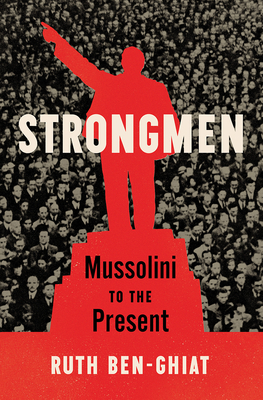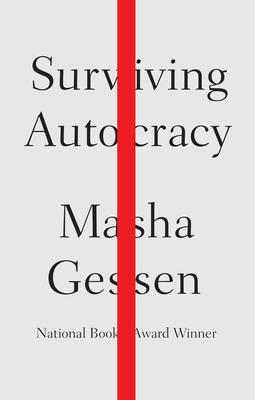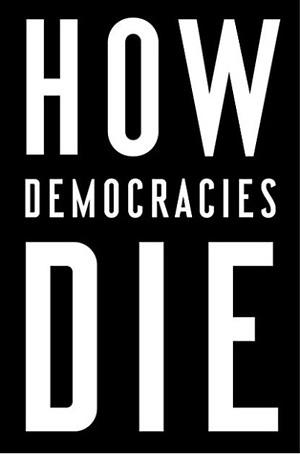Take a photo of a barcode or cover
Overview
Adapted from the list provided by Veterans Fighting Fascism:
https://www.veteransfightingfascism.org/antifascist-book-club-reading-list
Feel free to send suggestions of books to add to this challenge here: https://vampiremotif.tumblr.com/ask
Feel free to send suggestions of books to add to this challenge here: https://vampiremotif.tumblr.com/ask
Antifascist Reading List
32 participants (9 books)
Overview
Adapted from the list provided by Veterans Fighting Fascism:
https://www.veteransfightingfascism.org/antifascist-book-club-reading-list
Feel free to send suggestions of books to add to this challenge here: https://vampiremotif.tumblr.com/ask
Feel free to send suggestions of books to add to this challenge here: https://vampiremotif.tumblr.com/ask
Challenge Books

On Tyranny: Twenty Lessons from the Twentieth Century
Timothy Snyder
In On Tyranny, Timothy Snyder presents 20 lessons drawn from the darkest chapters of 20th-century history to offer a blueprint for resisting authoritarianism today. Each chapter serves as a practical call to action, urging readers to defend democratic institutions, resist propaganda, and stay vigilant against creeping authoritarianism.
The book’s concise yet profound lessons emphasize the power of individual actions in safeguarding freedom. Published by Penguin Random House, On Tyranny is an essential read for anyone committed to defending democratic values. (source)

Strongmen: Mussolini to the Present
Ruth Ben-Ghiat
In Strongmen, historian Ruth Ben-Ghiat examines how authoritarian leaders—from Mussolini to Putin—manipulate fear, deploy propaganda, and exploit crises to gain and maintain power. The book explores how these leaders use corruption, hyper-masculine imagery, and control over information to suppress opposition and reshape national identity.
Ben-Ghiat’s analysis highlights the vulnerabilities of authoritarian regimes and the critical role of resistance movements in challenging their power. Published by W.W. Norton, this book offers valuable insights for understanding and combating authoritarianism today. (source)

Surviving Autocracy
Masha Gessen
In Surviving Autocracy, Masha Gessen offers a detailed examination of the tactics used by autocrats to dismantle democratic institutions and reshape political realities. Drawing on experiences as a journalist in Russia, Gessen dissects how modern autocrats use propaganda, corruption, and institutional capture to solidify their rule.
The book emphasizes the importance of language, journalism, and civil society in resisting autocracy. Published by Riverhead Books at Penguin Random House, it serves as both a warning and a guide for defending democracy. (source)

How to Be an Antiracist
Ibram X. Kendi
In How to Be an Antiracist, by Ibram X. Kendi presents a transformative approach to understanding and dismantling systemic racism. Kendi argues that neutrality in the face of racism is not enough—individuals must actively adopt antiracist policies and practices. The book explores intersections of race, power, and policy, providing readers with practical steps to challenge and change systemic injustices.
Kendi’s work emphasizes collective action and policy change as essential tools for achieving equity. Available through Penguin Random House, this book is a critical resource for anyone committed to social justice. (source)

The Origins of Totalitarianism
Hannah Arendt
In this classic work, Hannah Arendt explores the ideological and historical roots of totalitarianism, focusing on Nazi Germany and Stalinist Russia. Arendt examines how propaganda, terror, and ideological manipulation dismantle democratic institutions and control society.
Her analysis of the nature of power, propaganda, and the fragility of democracy offers timeless lessons for resisting authoritarianism. Published by Penguin Classics, this work is essential for understanding the threats posed by modern authoritarian movements. (source)

How Democracies Die: What History Reveals About Our Future
Steven Levitsky, Daniel Ziblatt
In *How Democracies Die*, Steven Levitsky and Daniel Ziblatt examine the warning signs of democratic backsliding by analyzing historical and contemporary examples from the United States and abroad. The book argues that democracies often collapse not through military coups but through the gradual erosion of institutions, norms, and checks on executive power.
Levitsky and Ziblatt highlight the role of gatekeepers, the importance of mutual toleration, and the dangers of authoritarian populism. Published by Crown Publishing at Penguin Random House, this book serves as a crucial resource for understanding and defending democratic institutions. (source)

They Thought They Were Free: The Germans 1933-45
Milton Mayer
In They Thought They Were Free, Milton Mayer examines how ordinary Germans came to accept and support the Nazi regime between 1933 and 1945. Through interviews with ten former members of the Nazi Party, Mayer explores themes of conformity, propaganda, and the gradual erosion of freedoms that allowed authoritarianism to flourish. The book serves as a powerful warning about how democracies can deteriorate when citizens fail to question authority.
Published by University of Chicago Press, this work is an essential resource for understanding the social dynamics that enable authoritarianism. (source)

The Complete Maus
Art Spiegelman
The Complete Maus is a Pulitzer Prize-winning graphic novel that recounts the experiences of Art Spiegelman’s father, a Polish Jew and Holocaust survivor. Using anthropomorphic characters—Jews as mice and Nazis as cats—Spiegelman explores themes of survival, trauma, and memory. The dual narrative weaves between his father’s harrowing past and the strained father-son relationship in the present, offering profound insights into the lasting impact of genocide.
Published by Pantheon Books at Penguin Random House, this work is a powerful testament to memory and resistance. (source)

Prequel: An American Fight Against Fascism
Rachel Maddow
In Prequel: An American Fight Against Fascism, Rachel Maddow delves into a lesser-known chapter of American history, exploring how fascist sympathizers in the 1930s sought to align the United States with Nazi ideology. Drawing parallels to contemporary political dynamics, Maddow highlights the resilience of democratic institutions and the individuals who stood against authoritarianism. Her narrative serves as both a historical account and a cautionary tale, emphasizing the importance of vigilance in preserving democratic values.
Published by Crown Publishing, this book offers readers a compelling examination of past threats to American democracy and their relevance today. (source)



